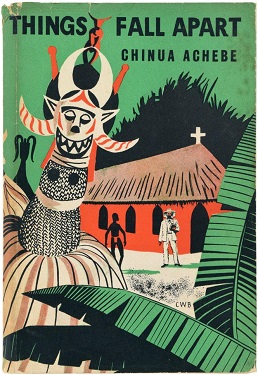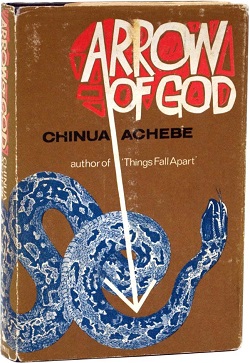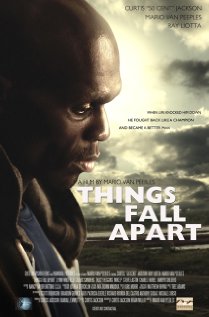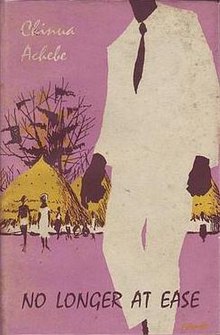
The kola nut is the seed of certain species of plant of the genus Cola, placed formerly in the cocoa family Sterculiaceae and now usually subsumed in the mallow family Malvaceae. These cola species are trees native to the tropical rainforests of Africa. Their caffeine-containing seeds are about 5 centimetres (2.0 in) across and are used as flavoring ingredients in beverages applied to various carbonated soft drinks, from which the name cola originates.

Chinua Achebe was a Nigerian novelist, poet, and critic who is regarded as a central figure of modern African literature. His first novel and magnum opus, Things Fall Apart (1958), occupies a pivotal place in African literature and remains the most widely studied, translated, and read African novel. Along with Things Fall Apart, his No Longer at Ease (1960) and Arrow of God (1964) complete the "African Trilogy". Later novels include A Man of the People (1966) and Anthills of the Savannah (1987). In the West, Achebe is often referred to as the "father of African literature", although he vigorously rejected the characterization.

Things Fall Apart is the debut novel of Nigerian author Chinua Achebe, first published in 1958. It depicts pre-colonial life in Igboland and the subsequent appearance of European missionaries and colonial forces in the late 19th century. It is seen as the archetypal modern African novel in English, and one of the first to receive global critical acclaim. It is a staple book in schools throughout Africa and is widely read and studied in English-speaking countries around the world. The novel was first published in the United Kingdom in 1958 by William Heinemann Ltd, and became the first work published in Heinemann's African Writers Series.

Nigerian literature may be roughly defined as the literary writing by citizens of the nation of Nigeria for Nigerian readers, addressing Nigerian issues. This encompasses writers in a number of languages, including not only English but Igbo, Urhobo, Yoruba, and in the northern part of the county Hausa and Nupe. More broadly, it includes British Nigerians, Nigerian Americans and other members of the African diaspora.

The culture of Nigeria is shaped by Nigeria's multiple ethnic groups. The country has 527 languages, seven of which are extinct. Nigeria also has over 1150 dialects and ethnic groups. The three largest ethnic groups are the Hausas that are predominantly in the north, the Yorubas who predominate in the southwest, and the Igbos in the southeast. There are many other ethnic groups with sizeable populations across the different parts of the country. The Kanuri people are located in the northeast part of Nigeria, the Tiv people of north central and the Efik-Ibibio are in the south south. The Bini people are most frequent in the region between Yorubaland and Igboland.
Mbaise is a region in Imo State in southeastern Nigeria. In the heart of Igboland, the region includes several towns and cities. It is a group of indigenous clans, connected by intermarriage. With a population density of over 1,000 people per square kilometer, Mbaise is West Africa's most densely-populated area; its 2006 population was 611,204.
African literature is literature from Africa, either oral ("orature") or written in African and Afro-Asiatic languages. Examples of pre-colonial African literature can be traced back to at least the fourth century AD. The best-known is the Kebra Negast, or "Book of Kings."
An ọgbanje is a term in Odinani for what was thought to be an evil spirit that would deliberately plague a family with misfortune. Belief in ọgbanje in Igboland is not as strong as it once was, although there are still some believers.
An Iyi-uwa is an object from Igbo mythology that binds the spirit of a dead child to the world, causing it to return and be born again to the same mother.
Okonkwo is a name that may refer to:

Arrow of God, published in 1964, is the third novel by Chinua Achebe. Along with Things Fall Apart and No Longer at Ease, it is considered part of The African Trilogy, sharing similar settings and themes. The novel centres on Ezeulu, the chief priest of several Igbo villages in colonial Nigeria, who confronts colonial powers and Christian missionaries in the 1920s. The novel was published as part of the influential Heinemann African Writers Series.

A Man of the People is a novel by Nigerian writer Chinua Achebe. Written as a satirical piece, "A Man of the People" follows the story told by Odili, a young and educated narrator, about his conflict with Chief Nanga, his former teacher who enters a career in politics in an unnamed fictional 20th-century African country. Odili represents the changing younger generation, while Nanga represents the traditional West African customs inspired by Achebe's native Nigeria. The book ends with a military coup, similar to the real-life coup organized by Major Chukwuma Kaduna Nzeogwu, Major Adewale Ademoyega, Major Emmanuel Ifeajuna, Captain Chris Anuforo, Major Donatus Okafor, and Major Humphrey Chukwuka.

Oyi is a Local Government Area in Anambra State, Nigeria. It is home to the Oyi people. The towns that make up the local government are Nkwelle-Ezunaka, Awkuzu, Ogbunike, Umuneba, Umunya and Nteje.

Chief Pete Edochie, MON is a Nigerian actor. Edochie is considered one of Nigeria’s most talented actors, being honored with an Industry Merit Award by Africa Magic and Lifetime Achievement by Africa Film Academy Although a seasoned administrator and broadcaster, he came into prominence in the 1980s when he played the lead role of Okonkwo in a Nigerian Television Authority adaptation of Chinua Achebe’s all-time best selling novel, Things Fall Apart. Edochie descends from the Igbo people of Nigeria and is a Catholic. In 2003, he was honored as a Member of the Order of the Niger by President Olusegun Obasanjo.

Igbo Americans, or Americans of Igbo ancestry, are residents of the United States who identify as having Igbo ancestry from modern day Nigeria. There are primarily two classes of people with Igbo ancestry in the United States, those whose ancestors were taken from Igboland as a result of the transatlantic slave trade before the 20th century and those who immigrated from the 20th century onwards partly as a result of the Nigerian Civil War in the late 1960s and economic instability in Nigeria. Igbo people prior to the American Civil War were brought to the United States by force from their hinterland homes on the Bight of Biafra and shipped by Europeans to North America between the 17th and 19th centuries.

The Thing Around Your Neck is a short-story collection by Nigerian author Chimamanda Ngozi Adichie, first published in April 2009 by Fourth Estate in the UK and by Knopf in the US. It received many positive reviews, including: "She makes storytelling seem as easy as birdsong" ; "Stunning. Like all fine storytellers, she leaves us wanting more".

All Things Fall Apart is a 2011 American direct-to-video drama film directed by Mario Van Peebles and starring Curtis "50 Cent" Jackson, Ray Liotta, Mario Van Peebles, and Lynn Whitfield. It was filmed in Michigan and premiered at the Miami International Film Festival.
Obi Wali was a minority rights activist, politician, distinguished senator, literary scholar, and an orator from Nigeria. Among his achievements, he fought for the cause of the Ikwerre ethnic minorities and argued that African literature should be written in African languages.
Christian Anieke is a Nigerian Roman Catholic priest and the founding Vice Chancellor of Godfrey Okoye University, Enugu, Nigeria. Ordained a priest in 2000, he is a professor of English Language and Studies. From 2006 to 2009, he was Provost of the Institute of Ecumenical Education. He became the Vice Chancellor of Godfrey Okoye University, which is owned by the Catholic Diocese of Enugu in Nigeria, in 2009. He is also the director of the university's Institute of Chinua Achebe Studies.
Emeka Patrick Nwabueze is the first Emeritus Professor of Theatre and Film Studies of the University of Nigeria, Nsukka. He is also a former dean of Faculty of Arts and ex- director of African studies of the institution.











